At Little Scholars, we have four pillars that underpin everything that we do at Little Scholars – for our children, families, educators, and our community.
As part of our annual awards, we have four awards dedicated to those Little Scholars’ values – learn, grow, inspire and contribute. This year, while our award-winning educators certainly personify all four pillars, but with their unique special skills and achievements, we’ve declared one clear winner for each pillar.
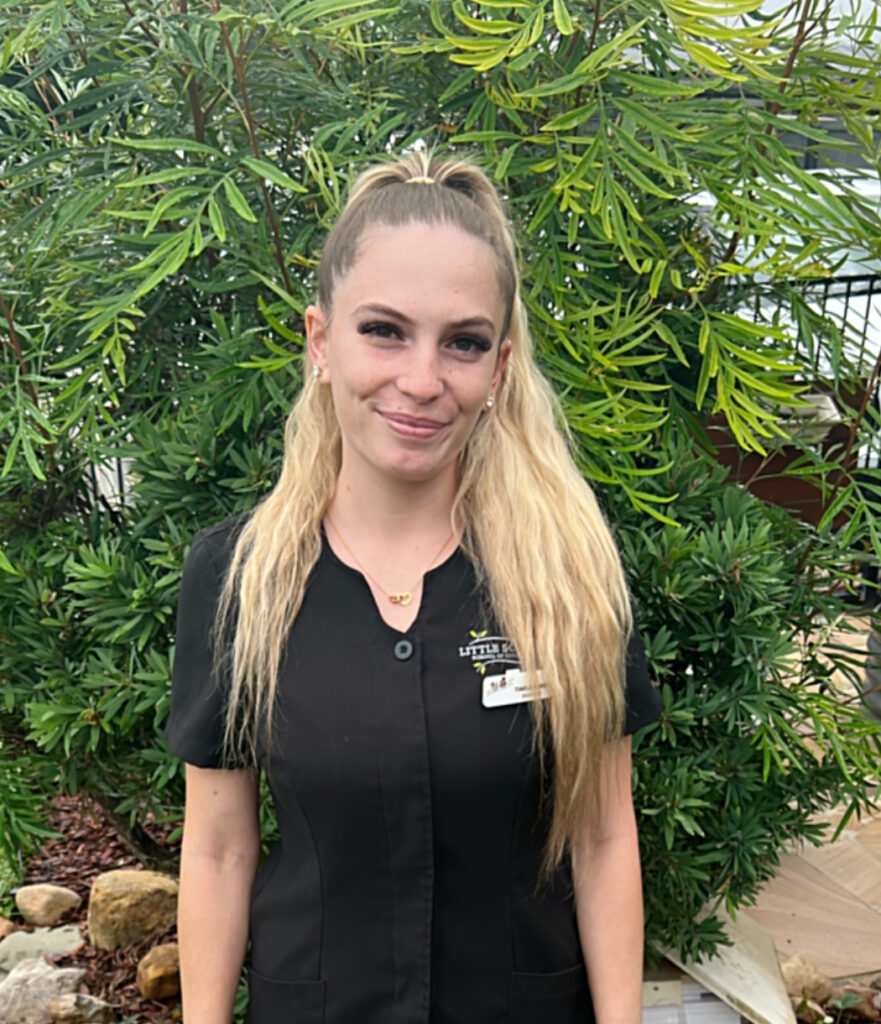
Tiahla at our Ashmore campus was named winner of the Pillar Award in the Learn category because she stepped up to become a lead educator, and she is happy to keep learning from her peers and further her education in the sector.
How long have you been an educator?
Four years
What made you pursue a career in early childhood education?
I feel like it was supposed to be as it all fell into place. I just came out of a casual job seeking for a new career journey and a job at Little Scholars Ashmore popped up. I applied for it and received the role the exact same day.
What’s the most rewarding and most challenging parts of your role? Watching their personalities blossom from a very young age, celebrating their personal developmental milestones with the children and building amazing relationships with families.
The most challenging part would be watching the children you have taught over the years move on to big school. We miss them so much!
What does winning this award mean to you?
Winning my award has meant the world to me, it makes me feel as though my progression and my achievements as an educator are noticed and valued.
Tahlia’s nomination
“Tiahla is always putting her hand up to learn new skills,” says Elise, campus manager for Little Scholars Ashmore.
“She is eager to grow from her peers, and will ask for help and support to build on her knowledge as an educator.”
Tiahla finished her Cert III and was keen to study her Diploma right away, Elise says.
“Tiahla has a bright future as an early childhood educator, as she values the importance of professional and personal growth through learning and collaborative partnerships.”
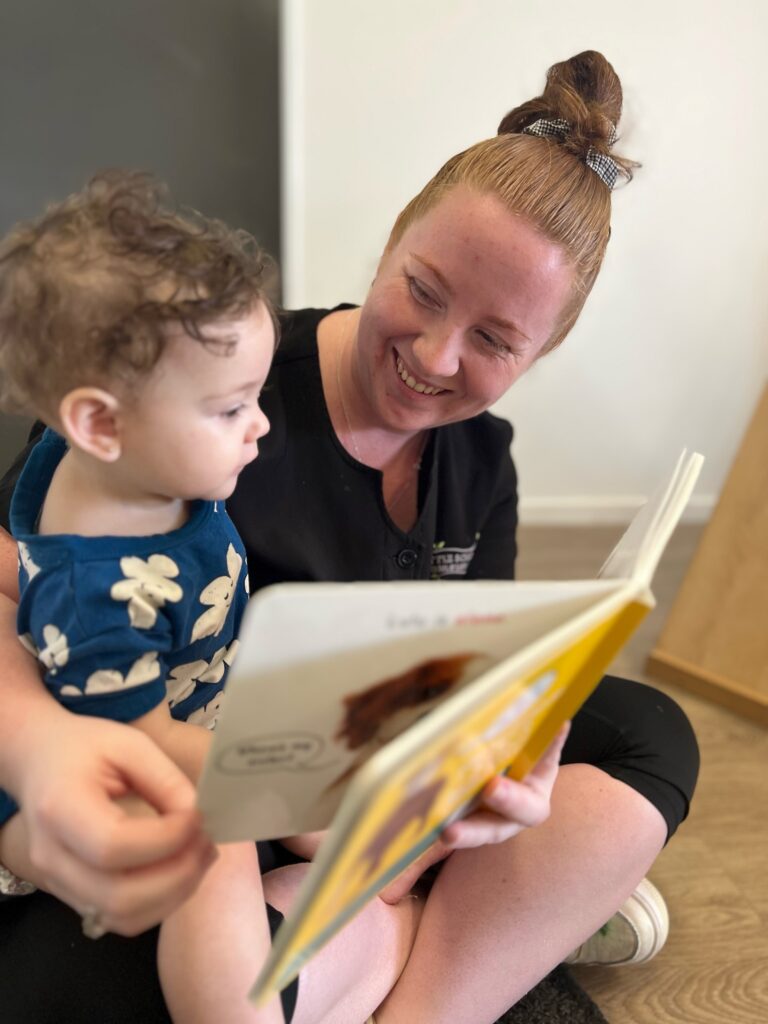
Keeva is an educator at Little Scholars Redland Bay South and is the recipient of an Inspire Little Scholars Pillar Award 2024.
How long have you been an educator, Keeva?
I have been an educator since 2016, so eight years now and have been with Little Scholars Redland Bay South since January 2023.
What made you pursue a career in early childhood education?
When I first started in early childhood education, I was studying an accounting degree, I quickly came to realise that I wanted to focus on my early childhood career. I fell in love with the children, how incredible they are and how much they could teach me. It wasn’t just the children that I fell in love with but also the challenges and limitless knowledge I could acquire and learn from to be the best educator possible.
What’s the most rewarding and most challenging parts of your role?
The most challenging part of my role is that I want to spend as much time as possible with each individual child everyday teaching them and learning from them but there is not always enough time. The most rewarding part of my job is watching the children hit all their goals and the excitement they display when they see us or accomplish goal. Mentoring and supporting other educators and seeing how far they have come in their journey is another rewarding aspect always leaving me feeling proud of their accomplishments.
What does winning this award mean to you? I was so shocked to receive this award, as I just turn up to work each day to do my best to support and guide both the children and educators. It felt so good to know that what I do each day is being noticed. It definitely makes you feel like you are doing a great job. To be recognised for the support and guidance I provide was so special and my heart felt full of love for my team. To me it cemented the fact that I am becoming the educator I always wanted to be
Keeva’s nomination
In Keeva’s nomination from Redland Bay South campus, it said, “Keeva is an educator who truly embodies each of the little scholars core pillars.
However, it is Keeva’s ability to inspire those around her, that is one of the most outstanding qualities. Keeva invests in mentoring those around her, inspiring their abilities to grow as educators utilising her existing knowledge and ability to learn more through professional development, to inspire each person to grow to full potential.”
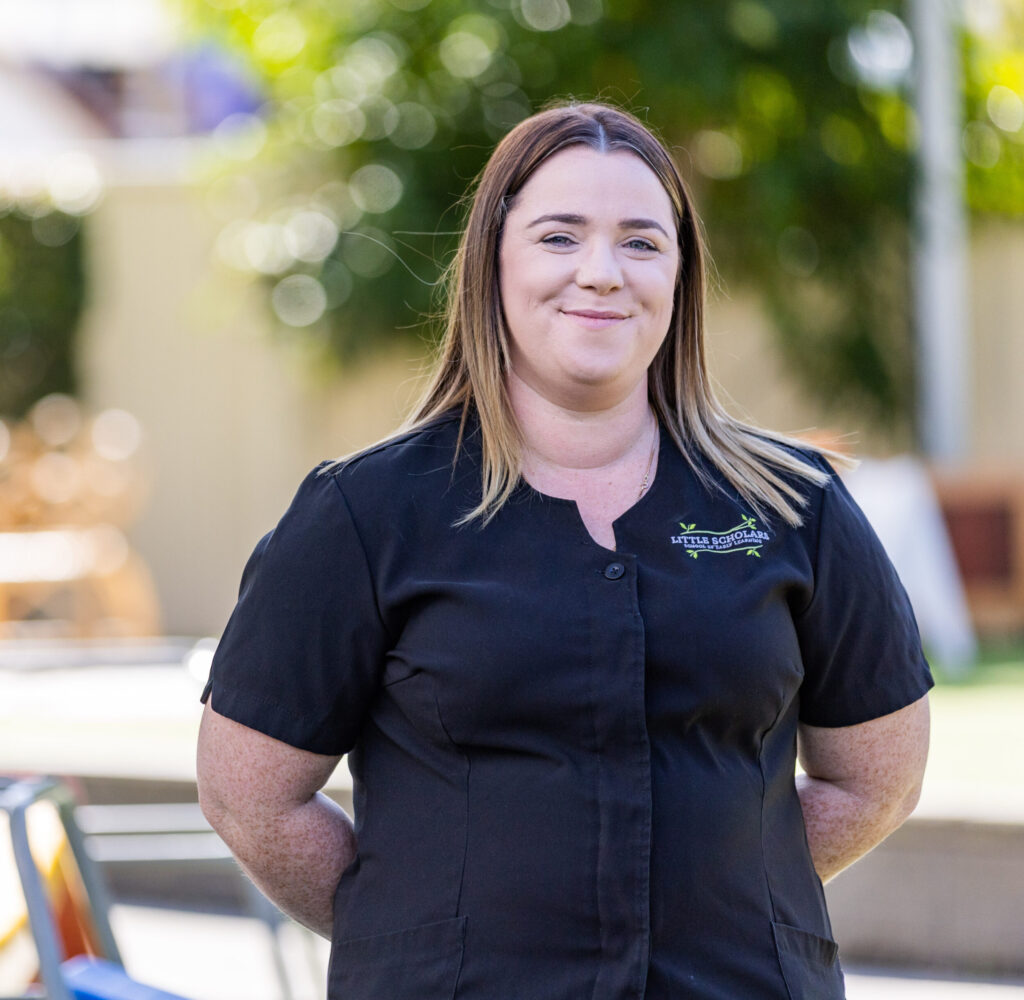
Claire is the educational leader at Little Scholars Nerang campus and has been awarded the 2024 Contribute pillar award.
How long have you been an educator and how long with Little Scholars?
I have been an early childhood educator for 18 years and with Little Scholars for nearly six years.
What made you pursue a career in early childhood education?
I’m not quite sure when I decided this was the path I wanted to take as I feel like it’s been my career goal since I was little. I still remember the way one of my kindergarten teachers, Miss Anderson, made me feel. She was fun, caring, and knowledgeable. I wanted to be that for someone and help children to learn in their own time and style. I liked the idea of being able to help shape the minds of little ones and set them up to be kind, respectful humans.
What are the most rewarding and most challenging parts of your role?
As educational leader within my campus, the most rewarding part of my role is watching both the children and educators flourish and grow as humans. It fills me with so much pride to watch the children reach their milestones and celebrate their successes with them as much as it does when educators gain new skills that help them in their professional career.
My biggest challenge is saying goodbye to the children as they venture off on their next journey into formal schooling. It happens each year but never gets easier to see them go after watching them grow and develop over the years.
What does winning this award mean to you?
Winning this award makes me feel like I am on the right path to creating what I hoped to. It reinforced the fact that I am in the right career and doing the right things to help create a better future and bring our campus closer to our local communities. I feel so proud to be recognised as the 2024 contribute pillar winner.
Claire’s nomination
Renee, campus manager, said, “Claire has remarkable attributes and will contribute to anything and everything you can throw at her.
She is passionate about supporting others and always willing to participate in any type of event, including her own professional growth.
Claire is dedicated within our Little Scholars family and her years with us is another wonderful example of her contribution to our sector.”
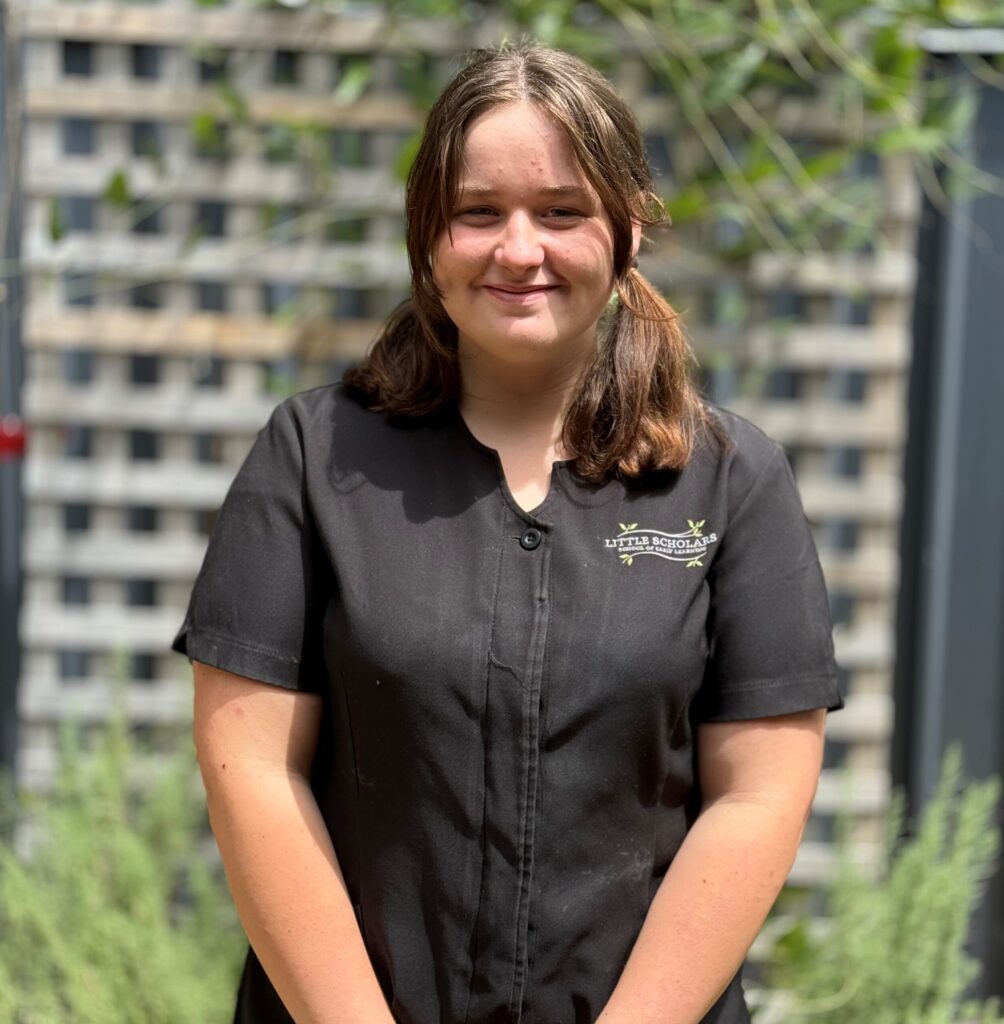
Stefenie, an educator at our Yatala campus, has remarkable attributes and we’re told her growth as an educator has been propelled by her enthusiasm to contribute, learn and inspire her team and go above and beyond not only for children, but families as well.
How long have you been an educator and with Little Scholars?
I have been an educator with Little Scholars for three years.
When you started, what was it about the role that made you want to stay in the sector?
When I was completing my work experience at the Yatala campus, I loved the relationships I was building with the children and I could see the impact educators had on the children.
What’s the most rewarding and most challenging parts of your role? The most rewarding part of my role is building such strong relationships with the children. The most challenging part is because I am so use to the younger age group, when I’m with the older children, I have to adjust my teaching style and interactions to their age groups.
What did being recognised for the Grow award mean to you?
It was really special because it really made me see how far I’ve come since being a 16 year old school based trainee. My confidence with the children and families, as well as my knowledge on child development has strengthened so much. I am a completely different educator and the fact that my leadership team can see and recognise it, it is a very special feeling.
Stef’s nomination
Stef at our Yatala campus was named winner of the Pillar Award in the Grow category because she’s grown from a trainee at the campus just a few years ago to now full time educator.
Sasha, campus manager at Little Scholars Yatala had this to say:
“Stef! What a superstar you are, and what a year you have had! From completing your Cert III as a school based trainee to jumping straight into full time work with us and then to go straight to studying your Diploma, nothing can stop you from achieving your goals, and we are so proud of how far you have come and the growth that you have achieved.”
The Little Scholars School of Early Learning recently joined forces with Southern Cross University for an innovative project, looking at how children engage and interact with social robots. NAO is a social robot that has been programmed to interact socially with people and this digital tool has the potential to serve as an educational aide in early learning settings.
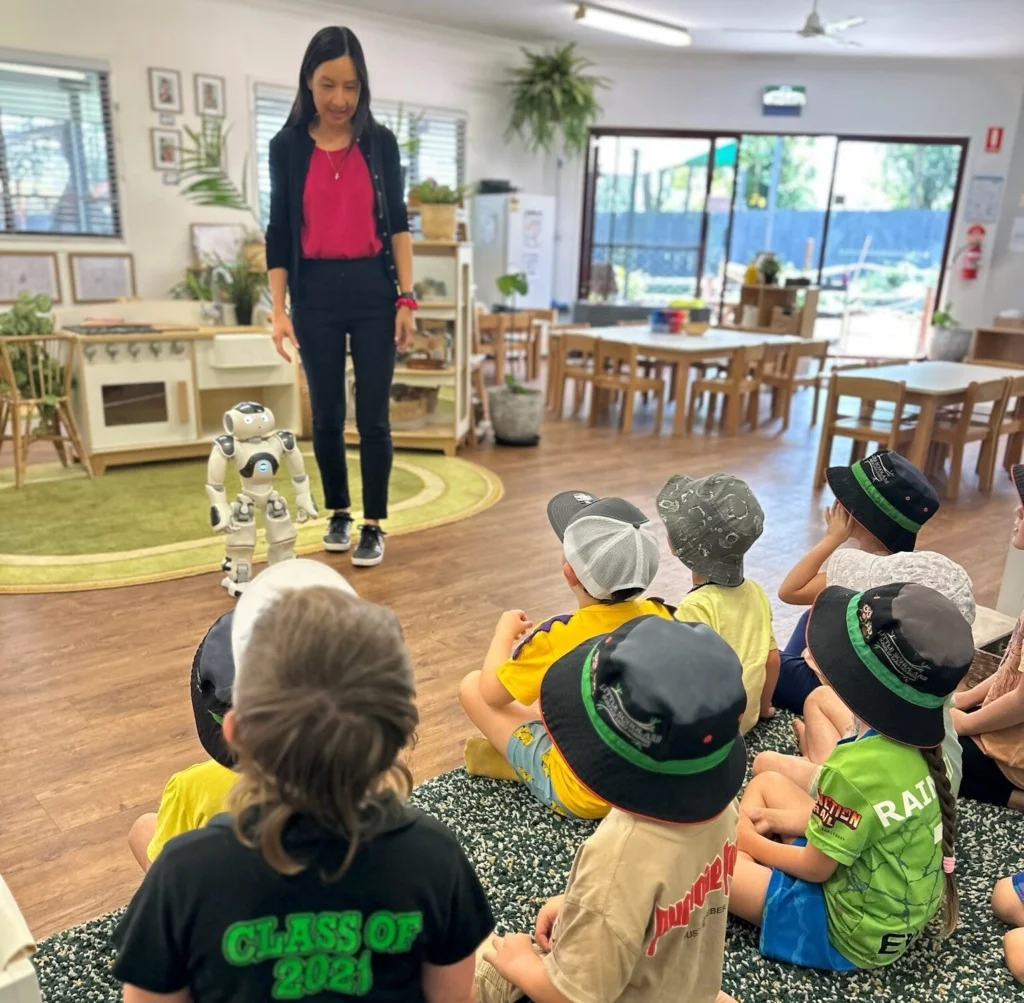
Little Scholars’ Yatala campus was buzzing with excitement as it welcomed Dr Michelle Neumann, Research Assistant Ruby-Jane Barry, and of course, NAO. The visits were part of an educational initiative that captivated the preschool and kindergarten children, as well as educators. The children couldn’t wait to see if Dr. Neumann and NAO had arrived and would dash to the parent lounge to check, educators reported.
The children had the opportunity for one-on-one interactions with NAO, participating in games like ‘Simon Says’, Q&A sessions, and activities focused on literacy.
Dr. Neumann, who leads the project, is an associate professor in early childhood education at Southern Cross University. She believes that this is a frontier that early learning is just starting to venture into.
Interestingly, Dr. Neumann’s journey into early childhood education began after becoming a mum to five children. With an honours degree in science, she decided to pivot her career towards education and early learning. She went back to university, earned her Graduate Diploma in Education, Bachelor of Primary Education, and then completed her PhD focusing on early literacy development. Her dedication has earned her a recent award for research excellence from Southern Cross University, recognising her work in early literacy, digital technologies (tablets, apps, social robots), child development, parent-child interaction.
While NAO has been used to support children’s learning about STEM (Science, Technology, Engineering, Maths) and coding, social robots also have the potential to be used to support language, literacy and social learning in the classroom, according to Michelle
“As a physically embodied version of a screen, a social robot may help young children from a range of diverse backgrounds develop their language and social skills,” Michelle said.
“Michelle and Ruby were so approachable and more than willing to let our little scholars meet NAO,” says Raylene, lead educator in the senior kindergarten room. “I was fascinated with NAO’s abilities, and the potential social robots could have in a classroom setting. As a lead educator, the benefits of having an additional learning assistant was something I was happy to advocate for, so I was quick to start drumming up more families to participate in the visits.”
Raylene said she had a lot of conversations with children preparing them for NAO’s visit, even conversations that maybe one day, the children might have robot friends to help their teachers in the classrooms.
“This was super exciting for the children. I did have to remind them and to the families that it wasn’t happening straight away, but the concept was well received. Families enjoyed the debates of whether it would take jobs from educators, and I enjoyed discussing this with them. By day two, Michelle and Ruby were needing to organise additional days to attend the service due to the influx of families wanting to participate,” Raylene said.
Raylene said on the first day, it was evident that although the children were excited, there were also plenty of nerves. Most of the children participated well, with a small handful quite shy, she said. As the program continued, the children got used to seeing Michelle, Ruby and NAO in the parent lounge, those children who were a little shy to begin with looked eager to have another turn.
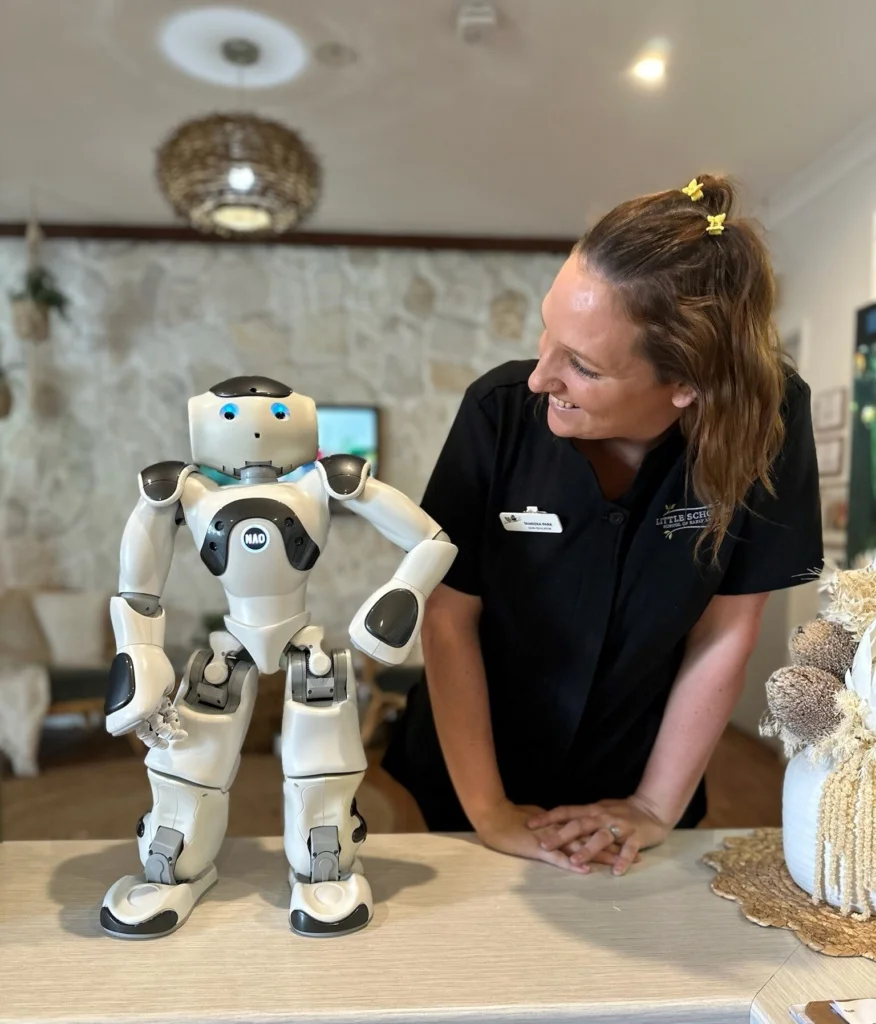
“This was obvious in my own son Tannen. Tannen was one of the few who participated on day one. The whole lead up was a confident ‘I’m having a robot friend’ until he got his robot friend,” Raylene said. “After his turn he told me he didn’t like it a lot because it was scary, however as the days went on, and more friends started to participate, and NAO became a familiar face, all of a sudden he was eager to come to the door to see if they were there yet, and talk to other children on the way in to see if they were going to go and play games with NAO that day. This is the way it unfolded for several children,” Raylene said.
After a few one-on-one visits to introduce NAO to children, Michelle made a final visit to introduce more campus children to NAO and play some games.
“You could see the comfort of the children who were already familiar with NAO, and it acted like a scaffold for the children who hadn’t had the chance yet to interact with him. Comments from children like ‘Oh, that’s just NAO’ and ‘I already played this game and it’s really fun’ to encourage peers along were incredible to hear because it was listening to four- to five-year-olds comforting each other and being confident with the experiences they had just had,” Raylene said.
Michelle said one day she’d love to introduce a full program which sees social robots in more early learning classrooms. But, she says, these are still relatively early days. Social robots are a work in progress, and she acknowledges they’re limited in what they can currently do. She’d love to also work with children who would benefit from additional language and literacy support. For that to work, NAO’s voice recognition needs development as it would need to have the ability to understand a spectrum of language milestones, she said.
“It would take a lot of time, guidance and professional development for educators… and a lot of support to be able to use the social robot in its current form,” she said. “But they’re working on AI generated social robots and these innovative opportunities may make using social robots more usable in the classroom.”
And, the robots are not cheap. NAO can cost up to $20,000 AUD, which she acknowledges would be financially prohibitive to many early learning settings. Michelle says her hope is that more research to can be done to better understand the role that social robots could play in supporting young children’s early learning experiences. With emerging advances in robotics, it may be possible that the production costs of these devices could one day become a more affordable educational tool.
The collaboration between Little Scholars and Southern Cross University has opened up new avenues for early learning, showcasing the potential of integrating social robots like NAO into educational settings. The overwhelmingly positive response from both children and educators alike underscores the limitless possibilities this technology could offer. As we look to the future, the hope is that advancements in AI and robotics will make these educational tools more accessible and tailored to the unique needs of early learners. This pioneering initiative serves as a testament to the boundless curiosity and adaptability of children, and the commitment of educators like Michelle and Raylene to push the boundaries of what’s possible in early education.
Jae Fraser, founder of Little Scholars, wholeheartedly supports the NAO project with Little Scholars.
“This is such an exciting project for our little scholars to engage in,” he says. “Introducing social robots to Little Scholars, isn’t just a leap in technology; it’s a giant step in nurturing young minds.
“We look forward to where this will go, and how we can use resources like this to continue the learning journey for Little Scholars.”
Additional information
The potential of social robots in early learning includes:
Potential barriers and obstacles for social robots in early learning:
Everyday life is full of risks and challenges, and at Little Scholars, we believe children need opportunities to develop the skills associated with managing risk and making informed judgements about risks from a very young age. Risky play helps to develop important life skill learnings such as; building resilience and persistence, critical-thinking skills, self-confidence and even extends their frustration tolerance.
We get it—no one wants to see little ones get hurt. It’s almost instinctual to hover nearby in case they stumble or to call out ‘be careful!’ when they’re taking risks. But could this actually be sending the message that we don’t trust their capabilities or instincts? Historical trends show that since the 1960s, there’s been a shift in how we view children. Once considered competent, responsible, and resilient, the modern perspective leans more towards constant supervision and protection. What used to be unrestricted and often unsupervised outdoor play has transitioned to structured, closely watched, and frequently indoor activities.
A lot of research has been devoted around the world to risky or adventurous play, and how parental attitudes as well as other factors played a part in children’s activities.
By participating in adventurous play, children are more likely to engage in activities that elevate their heart rate and breathing, leading to increased energy expenditure. This can help children meet the recommended guidelines for MVPA, which is at least 60 minutes of moderate-to-vigorous physical activity daily.
‘Educators facilitate gradual exposure to controlled risks, allowing children to develop confidence and judgment, ultimately empowering them to make informed decisions when navigating different situations.’
-Kristen Guymer
Adventurous play also offers opportunities for children to develop and enhance their motor skills, coordination, balance, and strength. These physical skills are essential for overall physical development and can contribute to improved physical fitness.
Furthermore, adventurous play provides children with opportunities to explore their environment, take risks, and challenge themselves. This type of play promotes creativity, problem-solving, and decision-making skills, as children navigate and overcome obstacles. It also fosters a sense of adventure, independence, and self-confidence.
Overall, adventurous play can be a fun and engaging way for children to meet their daily MVPA requirements while promoting physical fitness, skill development, and personal growth.
“We emphasise the importance of careful observation, encouraging children to identify potential hazards by looking, listening, and even touching when safe,” she says. “Educators also foster critical thinking by asking questions that prompt risk assessment, such as, ‘What could go wrong if…?’ We promote collaboration and communication, allowing children to discuss and share their perceptions of risk.”
Furthermore, Kristen shares, educators facilitate gradual exposure to controlled risks, allowing children to develop confidence and judgment, ultimately empowering them to make informed decisions when navigating different situations.
Before embarking on Bush Kinder experiences or similar activities, educators guide children through risk assessments:
Hayley Yates, a lead educator at our Yatala campus agrees that discussions with children previously help prepare for and mitigate risk.
“We support risky play through our discussions with the children,” Hayley says. “If it’s something that has a big risk, example climbing trees, we talk about what we should look out for when climbing, how big the branches need to be to be safe and things of that nature. For both the younger and older children we use language like ‘Notice how this is this? Another example would be walking on slippery rocks, I would say ‘notice how that rock is wet? That might be slippery’, then giving them the option to continue to that rock or a different one.”
Hayley says through important discussions educators are guiding children by asking questions and role modelling safe behaviours.
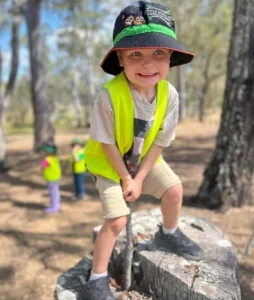
At Little Scholars, we believe that spending time in nature has numerous benefits for children, including improved physical health and strength, enhanced cognitive development, and better emotional regulation. Through our Bush Kinder program, children have the opportunity to connect with nature on a deep level, learn about the environment, be challenged beyond the classroom, and engage in meaningful, hands-on experiences.
During our Bush Kinder sessions, children have the opportunity to engage in a range of activities, from nature walks and bird watching to building shelters and learning about indigenous culture. Children climb, scramble, jump and more in nature’s playground.
In this natural environment, children encounter diversity, novelty, challenges, and even some calculated risks. Their senses come alive as they engage with sticks, tree holes, water, rocks, sand, and dirt—nature’s abundant toys.
Our Bush Kinder educators are highly experienced and qualified in outdoor education and child development. They are passionate about providing children with meaningful learning experiences in a safe and supportive environment. We take the safety and security of our children very seriously. Our Bush Kinder program is conducted in a safe and secure outdoor environment, with strict protocols in place to ensure the well-being of all children.
But risky play is not limited to bush kinder.
Our outdoor areas are thoughtfully designed, including forts and equipment, all with intention of helping children navigate risk, endure challenges and build motor and fine motor skills.
Helena Vairy, an educator at our Ormeau Village campus, shares an example of how she helps children assess risk and how to complete ‘risky’ tasks safely.
“The way I like to teach children to access risk are by providing them with the materials which are needed and seeing how the children act on these,” Helena says. “
“The other week myself and a couple of the Kindergarten children set up the sandpit I placed the crates in a line and stacked one on top of the other. One child Mahli said ‘this looks like a runway maybe we can walk and then jump off the crates.’ What a great idea this was, the children were nervous at first but I stood right next to them to help. I asked the children, ‘do you think you can jump off the crated and land with your feet flat?’ I then demonstrated and the children too were off jumping.
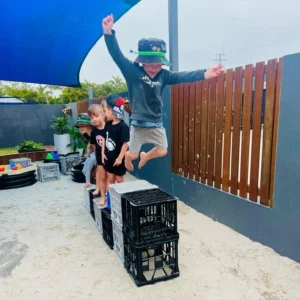
We love this story because it shares how children lead their own learning experience, consider risks, and support and encourage each other.
All of our campuses have recently introduced woodworking stations, designed to help children exercise their creative and critical thinking skills. It allows them to express their ideas and figure out solutions to their projects. It’s also a great way to introduce risky play, as the risks are managed and educators are actively supervising, but woodworking teaches children about safety and understanding risk.
“As they pick up their hammers, they’re getting ready to work on their pincer grip,” says Katie, educational leader at our Parkwood campus. “Things like that prepare them for school. In order to prepare to help the children use these safely, we’ve been having group discussions and asking them different questions about how to use the tools, what they think the tools do and what they can make in the future.”
It’s clear that risky play isn’t just about letting children run wild; it’s a calculated approach to help them develop essential life skills. At Little Scholars, we’re not just about keeping your little ones safe; we’re about preparing them for life. Our educators are trained to guide children in assessing risks, making it a learning experience that builds confidence and safe judgment. So, parents, it might be time to loosen the reins a bit. Let’s trust our children to make informed decisions, even if it means resisting the urge to shout, ‘Be careful!’ every so often. After all, life is full of risks and challenges, and what better time to learn how to navigate them than in the formative early years? You’ll be amazed at what they can achieve when given the freedom to explore, assess, and conquer.
We know you want to give your child the best possible start in life. We foster nurturing relationships between our educators and your child, building and gaining their trust so we can support your child as they take on risks and challenges safely and confidently. Book a tour today to get started!
Further reading:
Because we offer a transition to school program through our kindy and pre-kindy studios, from time to time, our educators and early childhood teachers are asked, ‘when are you going to teach my child to read?’ to which our answer is, we already are! But perhaps, not in the way parents expect.
The expectation from parents sometimes seems to be that your child will finish their time with Little Scholars and walk into prep knowing how to read, but that’s not exactly our aim.
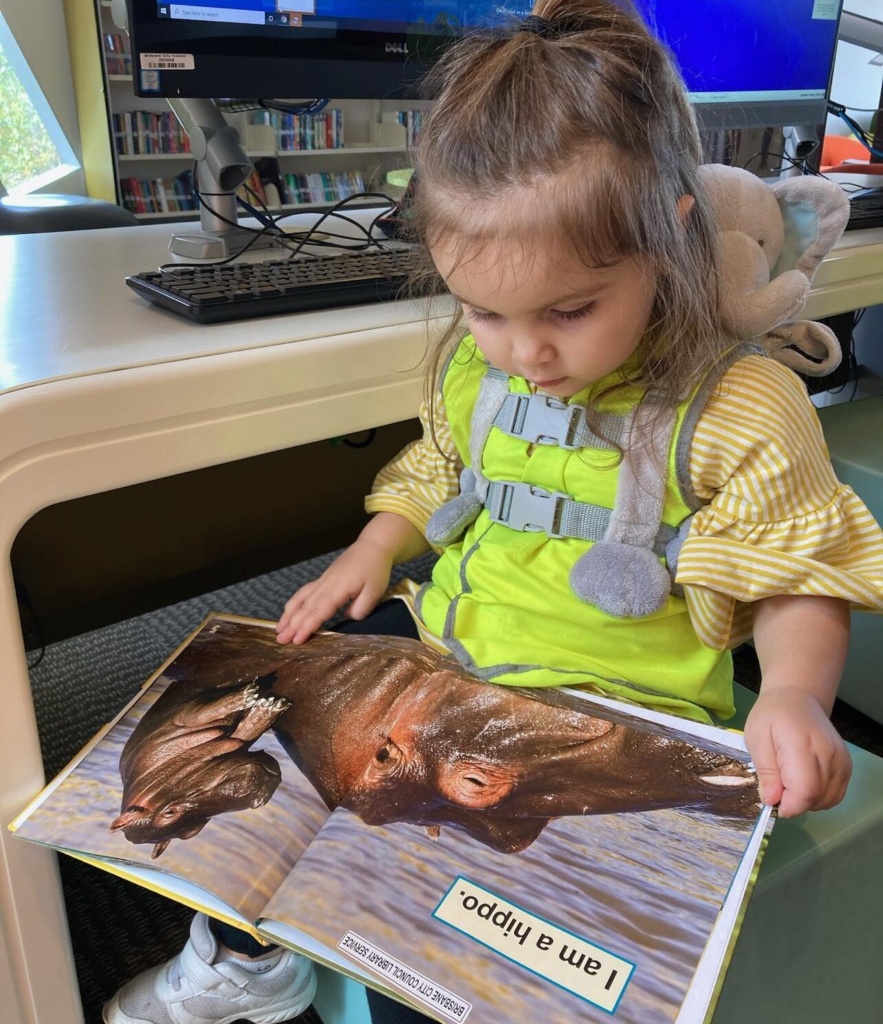
Learning to read really starts from infanthood, and is a big process. In fact, research has found newborns’ brains are prewired to be receptive to seeing words and letters. This means babies are already getting ready to read at birth. The relevant part of the brain, known as the “visual word form area” (VWFA), is connected to the language network of the brain, and was discovered by researchers at Ohio State University, who analysed the brain scans of 40 one-week-old babies, as part of the Developing Human Connectome Project.
Researchers compared these to similar scans from 40 adults who participated in a separate Human Connectome Project. The VWFA is next to another part of visual cortex that processes faces, and it was reasonable to believe that there wasn’t any difference in these parts of the brain in newborns. Because as visual objects, faces have some of the same properties as words do, such as needing high spatial resolution for humans to see them correctly.
But the researchers found that even in newborns, the VWFA was different from the part of the visual cortex that recognises faces, primarily because of that connection to the language processing part of the brain.
Lead researcher Zeynep M. Saygin’s team is now scanning the brains of three and four-year-old children to learn more about what the VWFA does before children learn to read.
Research has also showed babies can differentiate their native language from another language when they’re only hours old, which means they begin processing language in the womb. And, amazingly, studies have also found that at birth, the infant brain can perceive the full set of 800 or so sounds, called phonemes. Phonemes form every word in every language.
People can’t learn to read without understanding language, so your child has been working on learning to read since birth!
We encourage language development in many ways understanding that oral language is a significant aspect of early literacy, educators engage in song, rhyming and make use of picture books, to tell a story. Through our discussions and interactions with the children, and observations watching children play and what they’re interested in, we extend on their interests as part of our educational and intentional approach. So, for example, if educators see two children playing with toy dinosaurs, they may chat with them about why they’re interested. Then, they may have a conversation with the class about who else might be interested in dinosaurs. Based on the conversation, if many of the children are, they may set up sensory experiences, art opportunities and get relevant books on the topic of dinosaurs and read them together.
We also use words visually for many of our activities, even if they aren’t book-related, so that children begin to recognise words and associate them. Our environments place great emphasis to embed literacy print across all play spaces, this supports rich language experiences. Educators model words through children’s play, for example, when a child is engaged in block play, the educator will discuss the activity with them, exposing children to words, such as ‘you are putting a block on the top,’ (or underneath, or on the side.) These elements of language are also known as ‘positional language’ and introduce children to literacy and elements of numeracy at the same time.
At Little Scholars, we have a specific approach to learning to read. It’s called the 3a Abecedarian Approach Australia to reading. This is where children are active in conversational reading.
A long 1970s study in the US was the basis for the now well-adapted approach. The Abecedarian Project was a controlled scientific study of the potential benefits of early childhood education for disadvantaged children. Children born between 1972 and 1977 were randomly assigned as babies to either the early educational intervention group or the control group.
Children in the experimental group received full-time, high-quality educational intervention in an early learning setting from infancy through age
At the age 30 follow-up study, the treated group was more likely to hold a bachelor degree, hold a job, and delay parenthood, among other positive differences from their peers.
The 3a Approach encourages the adult and child to go ‘back and forth’ in conversation. There are three main levels to try – the first level is seeing, then showing, then saying.
Make it a conversation by asking your child to do something and not always following the words in a book.
“Can you see an owl? “Can you say owl?” “Can you show me an owl?”
At Little Scholars, we start with comprehension when looking at books – the thinking and talking about and enjoying the books we read together either in a group or one-on-one. Once children have a connection to books and reading, that’s when we can start teaching the ‘word parts’ of being a reader.
This is also something parents can and should do at home. Working with families is a core part of the Abecedarian approach! Parents are their children’s first educators, so we believe it’s to support families to grow in confidence as their children’s first educator, and reading together daily supports successful young readers. If you’d like to learn more, talk to your children’s educators or your campus manager for more information.
Read more:
At Little Scholars, we have four pillars that underpin everything that we do at Little Scholars – for our children, families, educators, and our community.
As part of our annual awards, we have four awards dedicated to those Little Scholars’ values – learn, grow, inspire and contribute. This year, while our award-winning educators certainly personify all four pillars, but with their unique special skills and achievements, we’ve declared one clear winner for each pillar.
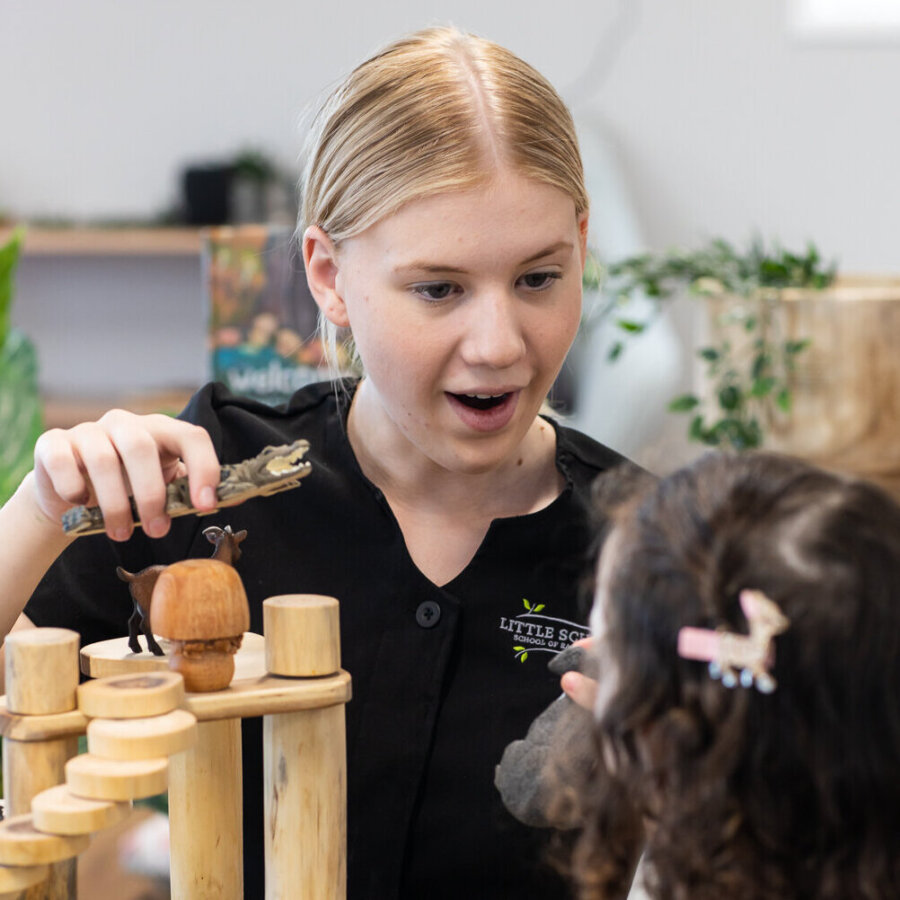
Ellissa at our Ormeau Village campus was named winner of the Pillar Award in the Learn category because she stepped up to become a lead educator, and she is happy to keep learning from her peers and further her education in the sector.
Ellissa is finishing up her studies with her Cert III, then she’ll be moving onto her Graduate Diploma.
From her submission: Ellissa has stepped up into her Lead role during last year and we have watched her grow from assistant to well-deserved Lead and take charge in her space, leading her colleagues while taking feedback on board and striving to excel.
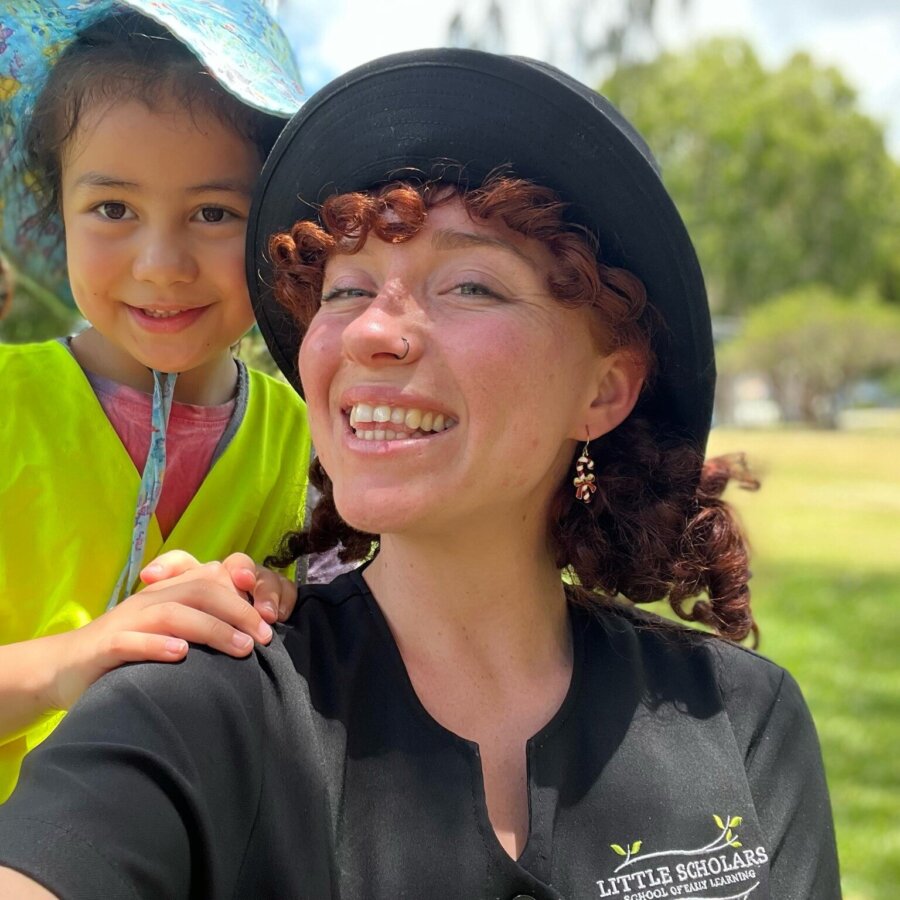
Ella’s experience as a parent with a child at Little Scholars was actually the reason she became an educator herself! Ella is the recipient of an Inspire Little Scholars Pillar Award 2023.
Ella’s nomination
Ella is an educator with the Little Scholars Deception Bay campus, which recently was assessed Exceeding under the National Quality Framework for Early Childhood Education and Care.
In Ella’s nomination to us, it said, “Ella is an inspiration for all in the Deception Bay community. We had some outstanding feedback from the department through our assessment and rating process. Before the process even started, the assessor had mentioned the passion and authenticity observed in Ella’s interactions with our children, families and community. In the assessor’s words – ‘she could sit and watch Ella all day long.’ From one of Ella’s colleagues, ‘the educator she is, is who I aspire to be in my future teaching career. She is strong, but also so caring to each individual child.’
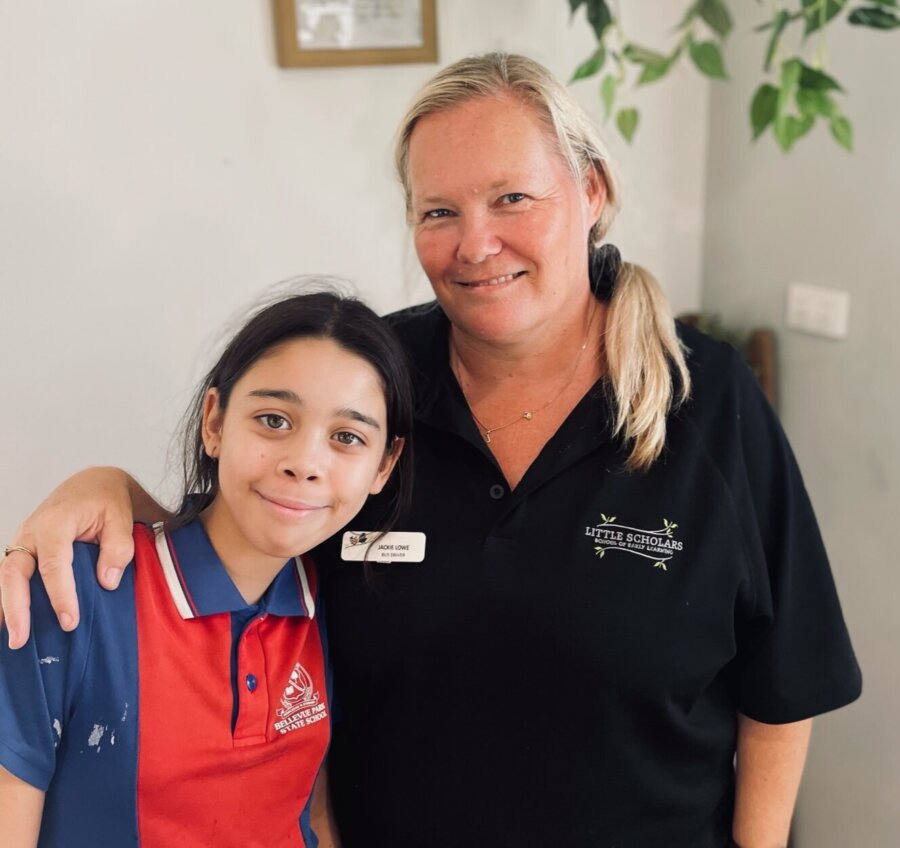
Jackie is an educator at Little Scholars Ashmore campus. In her first year working for us, she was nominated for a Pillar award!
Jackie’s nomination
Campus manager Elise said, ‘Jackie is our jack of all trades! Jackie fits many hats at our campus. From driving the bus to being in the studios to going on vacation care, she wears her many hats with a smile on her face. Her bubbly nature and willingness to help the team wherever needed is admirable. We appreciate her dedication and consistent contribution to the campus.
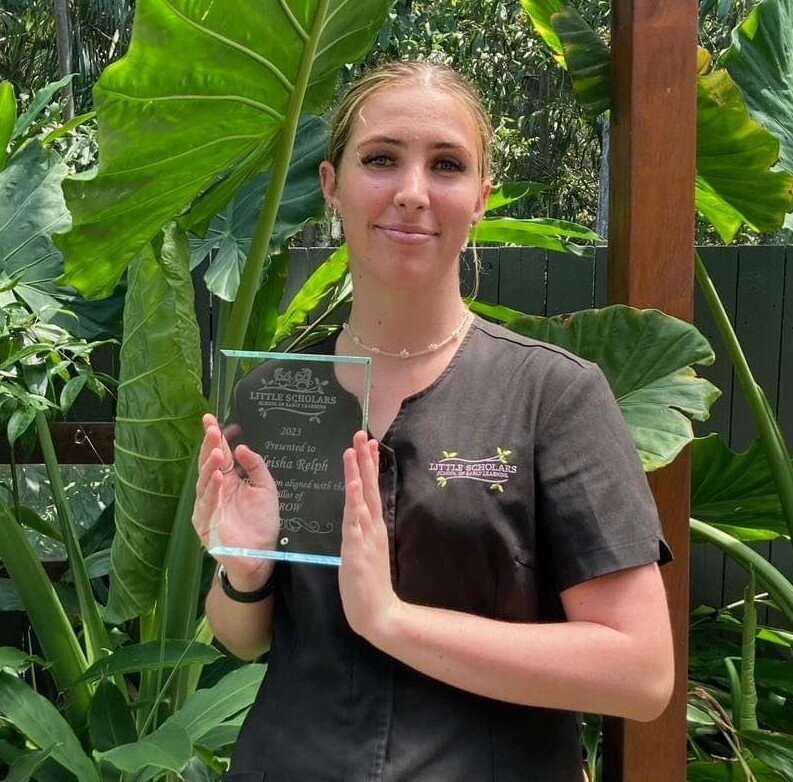
Aleisha has remarkable attributes and we’re told her growth as an educator has been propelled by her enthusiasm to contribute, learn and inspire her team and go above and beyond not only for children, but families as well.
I have been an educator since the end of January 2020. Prior to this, I was a trainee at Little Scholars Nerang since September of 2018 studying my Diploma.
Aleisha’s nomination
Aleisha at our Nerang campus was named winner of the Pillar Award in the Grow category because she’s grown from a trainee at the campus just a few years ago to now full time lead educator, her gentle touch, her willingness to inspire and help others, she was a clear choice for campus manager Renee.
Aleisha is no stranger to accolades, she won Educator of the Year – Peer Choice twice previously. Little Scholars was her first employer in her early childhood education career!
At Little Scholars School of Early Learning, we’re dedicated to shaping bright futures and instilling a lifelong passion for learning. With our strategically located childcare centres in Brisbane and the Gold Coast, we provide tailored educational experiences designed to foster your child’s holistic development.
Let us hold your hand and help looking for a child care centre. Leave your details with us and we’ll be in contact to arrange a time for a ‘Campus Tour’ and we will answer any questions you might have!
"*" indicates required fields